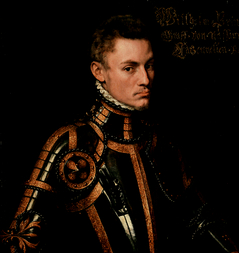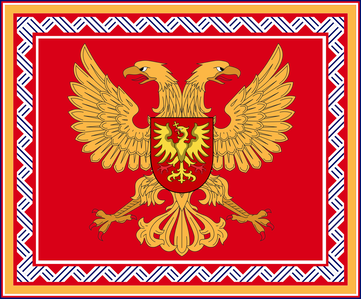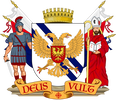HIH Prince Edward
 A common representation of HIH Prince Edward
A common representation of HIH Prince Edward
His Imperial Highness Prince Edward I is Ashukovo's Stadtholder, serving in this capacity since January 12, 2018.
Prince Edward has previously served as President between 2013 and 2014, and in 2017.
Edward is considered as one of the two Founding Fathers of Ashukovo, having established the nation on May 25, 2013 with Prince Joseph.
Prince Edward has previously served as President between 2013 and 2014, and in 2017.
Edward is considered as one of the two Founding Fathers of Ashukovo, having established the nation on May 25, 2013 with Prince Joseph.
The Stadtholder's office
 The Stadholder's Standard
The Stadholder's Standard
The Most Honorable Lord Stadholder of the Republic of Ashukovo, colloquially known as the Stadtholder of Ashukovo, is the head of state and head of government of Ashukovo, the guarantor of the Constitution, and commander-in-chief of the Ashukov Federal Armed Forces.
The Stadtholder is elected by the people for a term of two years, and there is no limit on the number of terms one can serve. The Stadtholder does not have an official residence and may reside wherever he chooses.
The office of Stadtholder is a direct successor to the office of President.
Legislative role
The Stadtholder's legislative functions are described in the Constitution in Chapter IV: Legislation, specifically Articles 61 and 62. Upon receiving a bill, the Stadtholder has two options:
Executive role
The Stadtholder holds a high role in executive governance. He appoints his cabinet to the Council of Ministers and directly oversees their executive activities. He also acts as the nation's top diplomat and may sign international treaties at his discretion.
Judicial role
The role of the Stadtholder in the judiciary is negligible.
The Stadtholder is elected by the people for a term of two years, and there is no limit on the number of terms one can serve. The Stadtholder does not have an official residence and may reside wherever he chooses.
The office of Stadtholder is a direct successor to the office of President.
Legislative role
The Stadtholder's legislative functions are described in the Constitution in Chapter IV: Legislation, specifically Articles 61 and 62. Upon receiving a bill, the Stadtholder has two options:
- Sign and promulgate the bill, making it an act upon the Stadtholder's signature and the Grand Chancellor's declaration of "The Senate has adopted the following:"
- Decline to sign the bill; after a passed bill has gone seven days without the Stadtholder's signature, it will be regarded as failed.This system gives the Stadtholder a veto power, whereby he can go seven days without signing a bill and it would thus fail
Executive role
The Stadtholder holds a high role in executive governance. He appoints his cabinet to the Council of Ministers and directly oversees their executive activities. He also acts as the nation's top diplomat and may sign international treaties at his discretion.
Judicial role
The role of the Stadtholder in the judiciary is negligible.

